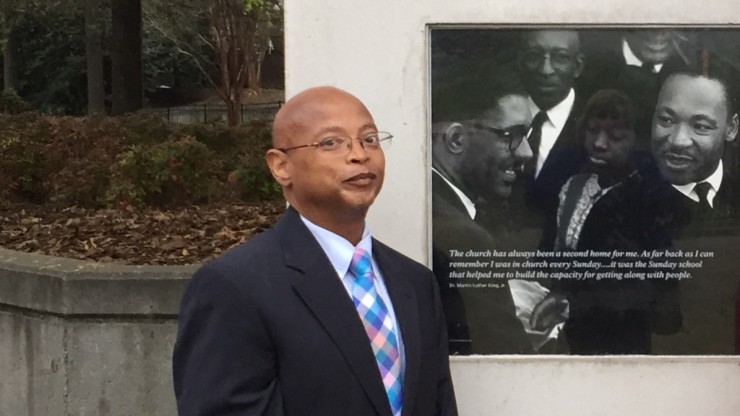
Houston Roberson (1958 - 2016)
Houston Bryan Roberson (1958-2016) was the first African American hired to a tenure-track position in the College of Arts and Sciences and the first African American to earn tenure at the University of the South. He also was the first member of the college faculty who devoted their scholarship and teaching to the subjects of African American history and culture. When he died in December 2016, Dr. Roberson enjoyed the universal respect and affection of his Sewanee faculty colleagues and the devotion and gratitude of two generations of students who enrolled in his courses. Beyond the Mountain, his major publications on the Dexter Avenue Baptist Church in Montgomery, Alabama, the Abyssinian Baptist Church in New York City, and the study of African American churches and religions in general have influenced a generation of scholars of African American history and the Civil Rights Movement. We have named our initiative after him as a memorial to honor his historic contributions to the University of the South, to recognize his signal achievements as a scholar, and, above all, to inspire our Project to realize the ideals of rigorous scholarship, social justice, and high moral character that marked his life and career.
Born in 1958 in Stuart, Virginia, Dr. Roberson was the son of the late Ralph and Madelene Roberson. He was educated in the local public schools, where he was a precocious and excellent student. He received his BA magna cum laude from Mars Hill College, earned an MA from Wake Forest University, and then taught history at Chapel Hill High School in Chapel Hill, North Carolina, where he was legendary for the high standards he demanded from the many students whose lives he shaped. He left high school teaching to earn his PhD at the University of North Carolina at Chapel Hill and joined the Sewanee faculty in 1997 after receiving his doctorate. From his days teaching high school history through his years at the University of the South and his many publications, Dr. Roberson helped countless young people understand the fundamental point that African American history constitutes not a minor element of American history but its very core.
In 2009 Dr. Roberson published a short essay, “The Problem of the Twentieth Century: Sewanee, Race and Race Relations,” in the University's sesquicentennial volume, Sewanee: Perspectives on the History of the University of the South. This essay was the first piece of written scholarship to address directly and forthrightly the history of race on campus and in the Sewanee community. In breaking the “color line” of Sewanee’s written history, Dr. Roberson changed how we think about the history of this community and university. “Whether we consider the African American presence or the issue of race at Sewanee from [any] vantage point” of the university’s history, Dr. Roberson wrote, “almost immediately we encounter the word: problem.” In this essay and in his teaching, Dr. Roberson sought to show that African Americans, race, and racial conflict were “not a ‘Negro’ problem but an American problem.” Likewise, the history of slavery and its legacies at the University of the South is “not a ‘Negro’ problem,” but a Sewanee problem. The path to racial reconciliation and a more inclusive and just campus environment begins with acknowledging the truth of Dr. Roberson’s basic assertion.
The essential insights of Dr. Roberson into the history of race and race relations in the Sewanee community form the core of the scholarly work and community engagement undertaken by what has, until this point, been called the Sewanee Project on Slavery, Race, and Reconciliation. In taking the new name, The Roberson Project on Slavery, Race, and Reconciliation, we do not alter our course or change the nature of the work we are doing. Rather, by memorializing the generosity of spirit, compassion, intellectual courage and wisdom of our late teacher, colleague, and friend, we acquire renewed inspiration and commitment to advance the causes of racial inclusiveness and justice in the community of the University of the South and beyond.

